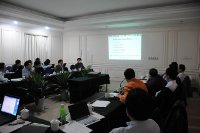 |
 |
|||||||||||||
|
|||||||||||||
|
|||||||||||||
|
Just a week after the International Workshop on Linear Colliders (IWLC2010) held in Geneva, China's Linear Collider Workshop (CLCW2010) organised by the Institute of High Energy Physics (IHEP) was held in Beijing Laffitte Hotel from 30 to 31 October. For the first time, China's linear collider community gathered together to exchange ideas and have a comprehensive discussion about China's participation in the International Linear Collider (ILC) and the Compact Linear Collider study (CLIC). “CLCW2010, as the first one in a Chinese domestic linear collider workshop series, is a very important event for China's high energy frontier community,” said Jie Gao, chair of CLCW2010 and of ALCSC (Asian Linear Collider Steering Committee).
Thirty front-line scientists on theoretical physics, experimental physics, detectors and accelerators from different parts of China convened in this workshop. As the chair of CLCW2010, Gao gave a general introduction on the progress of international cooperation in linear colliders. Then, ten talks ranging from recent status and progress on TeV physics, ILC experimental physics R&D, linear collider detector design and technology development, and linear collider accelerator R&D were given by experts from different institutes and universities including IHEP, Nanjing University, Peking University, Shandong University, Tsinghua University, and University of Science and Technology of China (USTC). During their talks and discussions, the Chinese scientists confirmed their interest in future electron-positron linear collider endeavours and expressed their strong willingness to raise dedicated linear collider funds from Chinese funding agencies. In fact, as a fast-developing country, especially in this transition phase of emphasising development quality and deepening international collaboration, China could play a more active role in a future linear collider. Recently, Hesheng Chen, director of IHEP, approved China's contribution to the ILC Global Design Effort (GDE) common fund. “It is very encouraging,” said Gao. “We strongly support the international cooperation in high energy physics, especially for the Large Hadron Collider (LHC) and the ILC, and hope that greater support could be given through reasonable channels,” said Yifang Wang, deputy director of IHEP. Barry Barish, director of the ILC GDE, also very strongly supports the CLCW series: “I hope to hear more great progress from the Chinese high-energy frontier community,” he said. “In recent years, the Chinese particle physics programmes have become more and more important to the global high-energy physics programmes. The IHEP accelerator is working very well and is playing a unique role. Besides that, results from the Daya Bay Reactor Neutrino Experiment are anticipated around the world. I hope and encourage that the growing energy frontier community will play a strong role as a linear collider becomes the next large global project.” Gao's ending remarks carried a spirit of determination that characterised the workshop. “As the chairman of ALCSC, together with ALCSC members, we will encourage and push continuously not only the ILC R&D efforts in individual Asian countries, but also collaborations among them, including personnel and technology exchanges,” he said. -- Min Zhang |
|||||||||||||
| © International Linear Collider |

